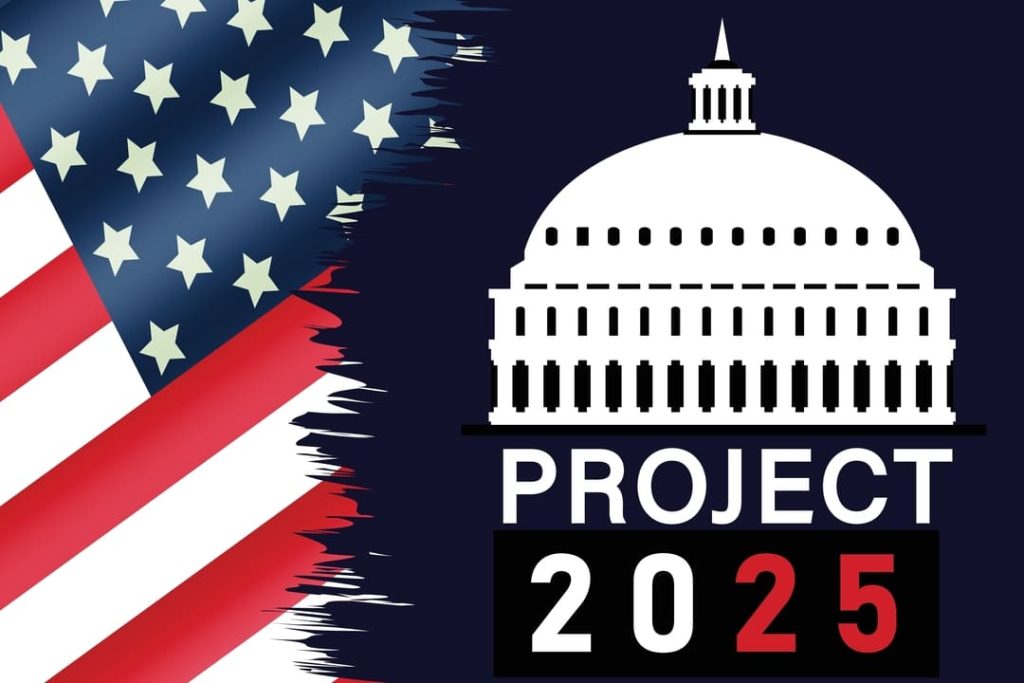Looking for Expert-Level VA Claim Answers?📱Call Us Now! 737-295-2226
Project 2025, spearheaded by the conservative think tank The Heritage Foundation, outlines a series of significant changes to the VA that could fundamentally alter the VA disability system and your rightfully earned VA benefits.
While these proposals are currently just that—proposals—there’s growing speculation that they could become reality if a Republican wins the presidency.
Among the most impactful suggestions are the expansion of private-sector providers for VA services, tightening the eligibility criteria for disability benefits, and a complete overhaul of the VA claims process.
Understandably, these ideas have raised alarms among veterans and advocacy groups, who fear that such changes could erode the vital support systems that countless veterans depend on.
Alright, let’s take a deep dive into these potential changes and explore what they could mean for you and your VA disability benefits.
Source: Read Project 2025’s Policy Recommendations for the VA
Table of Contents
Summary of Key Points
- Project 2025, developed by The Heritage Foundation, proposes significant reforms to the VA that could reshape the VA disability system and your VA benefits.
- These proposals are currently just recommendations, but they could become reality if a Republican administration takes office in 2025.
- Key suggestions include expanding private-sector providers for VA services, tightening eligibility criteria for disability benefits, and overhauling the VA claims process.
- VA disability expert Brian Reese suggests veterans shouldn’t worry yet, as these proposals need bipartisan support and extensive debate to become law. However, veterans and advocacy groups remain cautious about the potential impact on essential support systems.
What is Project 2025?
Project 2025 is a policy initiative by The Heritage Foundation, proposing major reforms to the federal government, including the VA.
The project aims to make government agencies more efficient and aligned with conservative values.
For the VA, it suggests changes like increasing privatization, streamlining the disability claims process, and revising eligibility criteria for benefits.
These proposals could be implemented if a Republican administration takes office in 2025.

Project 2025 VA Benefits Impact: Proposed Policy Reforms
Here’s a detailed examination of the eight key recommendations from Project 2025 for the VA and their potential impact on your VA benefits:
1. Streamlining the VA Disability Claims Process:
- Automation: Project 2025 emphasizes the need for increased automation in the VA claims process to reduce delays and improve accuracy. By automating repetitive and time-consuming tasks, the VA could process claims more efficiently, potentially cutting down the long wait times that many veterans currently experience. Automation could also help in flagging errors and inconsistencies in claims, leading to more accurate outcomes.
- Private Contractors for Medical Examinations: The proposal suggests expanding the use of private contractors to conduct Compensation and Pension (C&P) exams required for VA disability claims. This approach aims to eliminate the current backlog and speed up the processing of claims by leveraging external medical professionals who can assess veterans more quickly than the overburdened VA medical staff.
2. Performance Metrics and Transparency:
- Public Reporting: The project encourages the Veterans Benefits Administration (VBA) to establish clear performance targets and publicly report on these metrics quarterly. This transparency is intended to hold the VBA accountable and drive continuous improvements in service delivery. Regular public reporting would allow veterans, advocacy groups, and policymakers to track the VBA’s performance and identify areas needing attention.
3. Pilot Programs and Technology Integration:
- Express 30 Initiative: The proposed “Express 30” pilot program aims to ensure that veterans’ first Fully Developed Claim (FDC) is processed within 30 days. This initiative would likely involve prioritizing these claims and using streamlined procedures to provide quicker decisions, offering much-needed relief to veterans awaiting their benefits.
- Private-Sector Technology: Project 2025 recommends integrating technology solutions from the private sector to enhance claims processing and reduce manual work. By adopting advanced data management systems, AI-driven decision-making tools, and other cutting-edge technologies, the VBA could significantly increase the speed and accuracy of claims processing.
4. Reducing Fraud and Improper Payments:
- Improper Payments: The project identifies improper payments—estimated at $500 million annually—as a critical issue. To address this, Project 2025 calls for enhanced tools, better training, and possibly regulatory changes to reduce these costly errors. This might include more stringent verification processes and the use of data analytics to detect fraudulent claims.
5. Reassessing Disability Ratings:
- Review of the VASRD: Accelerating the review of the VA’s Schedule for Rating Disabilities (VASRD) is proposed, with the aim of revising disability ratings to save costs while ensuring fairness to veterans. This reassessment could lead to changes in how the 900+ VA disabilities are rated, potentially affecting the level of compensation veterans receive. The goal is to align ratings more closely with the actual impact of disabilities on veterans’ lives, but there is concern that some veterans might see reductions in their ratings and benefits.
6. VA Workforce Reforms:
- Flexible Workforce: The VBA is encouraged to implement human capital management reforms to create a more flexible workforce. This could involve using contractors for processing tasks, allowing federal employees to focus on final decisions and more complex cases. A blended workforce approach could improve efficiency and reduce bottlenecks in the claims process.
- Acquisition Workforce: Project 2025 recommends improving the VBA’s acquisition workforce to ensure it contracts with top-tier private companies and engages more effectively with the private sector. This would likely involve more rigorous training for acquisition professionals and adopting best practices from private industry to enhance procurement processes.
7. Knowledge Exchange Program:
- Learning from the Private Sector: Establishing a knowledge exchange program with top-tier private-sector companies that handle similar work to the VBA is proposed. By leveraging the expertise and innovation of private companies, the VBA could adopt more efficient and effective practices, improving benefits processing and service delivery.
8. Organizational Culture and Innovation:
- Cultural Shift: The VBA is described as a risk-averse and insular organization. Project 2025 suggests a cultural shift towards greater innovation and technological savviness within its senior leadership ranks. Encouraging a more open and forward-thinking culture could lead to the adoption of new ideas and technologies that enhance the VBA’s operations.
- Senior Executive Leadership: Recruiting a more knowledgeable and technologically skilled leadership team is recommended to drive better solutions for the VBA’s challenges. This could involve bringing in leaders with experience in managing large, complex organizations and a track record of implementing successful technology-driven initiatives.
Other Considerations and Potential Reforms
- Improvement of IT Funding: The project suggests reassessing the VBA’s Information Technology budget, advocating for a larger share to support expanded automation and technological advancements. Given the increasing reliance on technology for efficient operations, a boost in IT funding could be crucial for modernizing the VBA’s infrastructure and improving service delivery.
- Reducing the Complexity of Benefits: While not advocating for wholesale benefits reform, Project 2025 highlights the need for better management and the use of private-sector technology to simplify and improve the administration of existing benefits. This could involve streamlining benefit categories, improving communication with veterans, and ensuring that the benefits system is easier to navigate.
- Emphasis on Risk Management: The VBA is encouraged to adopt private-sector risk management strategies to better handle the complexity of benefits administration. This might include the implementation of more robust internal controls, data security measures, and contingency planning to mitigate risks associated with large-scale operations.
Potential Risks and Concerns for Veterans
- Reduced Access to Care: The push towards privatization may lead to a reduction in the availability and quality of care for veterans, particularly those who depend on VA hospitals and clinics for specialized services. Privatization could result in a fragmented healthcare experience, where veterans may have to navigate multiple providers with varying levels of expertise in treating veterans’ specific needs.
- Disenrollment from VA Healthcare: Veterans without a service-connected designation could be disenrolled from VA-paid healthcare under Project 2025, further limiting their access to necessary services. This could particularly impact older veterans or those with non-service-connected health issues, forcing them to seek care through other, potentially less specialized, healthcare systems.
- Increased Burden on Veterans: Stricter scrutiny of claims and potential reductions in disability ratings could place a heavier financial burden on veterans. Many veterans rely on their disability benefits as a primary source of income, and any reduction in these benefits could have serious consequences for their financial stability and overall well-being.
Conclusion & Wrap-Up
Project 2025 represents a significant shift in how veterans’ services, particularly disability benefits, are managed and delivered.
While the initiative aims to increase efficiency, reduce government spending, and bring in private-sector practices, it also poses substantial risks to the support structures that veterans depend on.
As discussions around Project 2025 continue, it is crucial for veterans and advocacy groups to stay informed, voice their concerns, and engage actively in the policy-making process.
Ensuring that the needs of those who have served are adequately protected and prioritized must remain at the forefront of any changes to the VA system.

Project 2025 and VA Disability: Frequently Asked Questions (FAQs)
1. What is Project 2025?
Project 2025 is a policy initiative developed by The Heritage Foundation, a conservative think tank, which proposes significant reforms to various federal agencies, including the VA. The project aims to reshape how the VA operates, particularly in terms of the delivery of healthcare and disability benefits to veterans.
2. How could Project 2025 impact my veterans disability benefits?
Project 2025 proposes a range of changes that could affect VA disability benefits. These include tightening eligibility criteria for disability compensation, streamlining the claims process through increased automation, and potentially revising the VA’s Schedule for Rating Disabilities (VASRD). These changes could result in faster processing times but might also lead to stricter evaluations of claims, which could impact the benefits that veterans receive.
3. Will Project 2025 lead to the privatization of VA services?
One of the key proposals in Project 2025 is to expand the use of private-sector providers for VA services. This could mean that more veterans will receive care from non-VA providers, particularly in areas where the VA cannot meet demand. While this may increase access to certain services, there are concerns that it could lead to a reduction in the quality and availability of care provided directly by VA facilities.
4. What changes are proposed for the VA claims process?
When it comes to Project 2025 Veterans disability benefits, there are several suggested changes to the VA claims process, including:
- Automation: Increasing the use of automation to speed up claims processing and reduce errors.
- Private Contractors: Expanding the use of private contractors for medical examinations to eliminate backlogs and accelerate the claims process.
- Express 30 Initiative: A pilot program aimed at ensuring that veterans’ first fully developed disability compensation claims are processed within 30 days.
5. How might the eligibility criteria for disability benefits be affected?
The project suggests tightening the eligibility criteria for disability benefits, which could mean more stringent evaluations of claims. This could potentially result in fewer veterans qualifying for benefits or receiving lower disability ratings. The exact details of these changes would depend on how the proposals are implemented.
6. What are the potential risks associated with Project 2025?
Some of the potential risks include:
- Reduced Access to VA Care: Expanding privatization may lead to a decline in the availability of specialized care at VA facilities.
- Disenrollment from VA Healthcare: Veterans without service-connected conditions could be disenrolled from VA-paid healthcare, limiting their access to necessary services.
- Increased Financial Burden: Stricter scrutiny of claims and potential reductions in disability ratings could impose a heavier financial burden on veterans who rely on these benefits.
7. Will my current disability rating be affected by Project 2025?
While Project 2025 proposes a reassessment of the VA’s Schedule for Rating Disabilities (VASRD), it is not yet clear how this would affect existing ratings. However, there is a possibility that some veterans could see their ratings adjusted as part of a broader effort to align ratings more closely with the impact of disabilities.
8. What is the “Express 30” initiative, and how could it benefit veterans?
The “Express 30” initiative is a proposed pilot program under Project 2025 that aims to ensure veterans’ first fully developed disability compensation claims are processed within 30 days. This initiative is intended to reduce wait times and provide quicker decisions for veterans, offering them faster access to their benefits.
9. How does Project 2025 address fraud and improper payments in the VA system?
Project 2025 highlights the need to reduce fraud and improper payments, which are estimated to cost the VA $500 million annually. The project suggests implementing better tools, training, and possibly regulatory changes to minimize these issues, ensuring that funds are allocated correctly and efficiently.
10. What is the impact on VA workforce and organizational culture?
The project calls for reforms in the VA workforce, including the creation of a more flexible workforce that incorporates private contractors to handle processing tasks. Additionally, Project 2025 recommends a cultural shift within the VA to foster innovation, reduce risk aversion, and recruit more technologically savvy leadership to better address the challenges facing the VBA.
11. How will Project 2025 improve the use of technology in the VA?
Project 2025 advocates for reassessing and increasing the VA’s Information Technology (IT) budget to support expanded automation and technological advancements. By integrating private-sector technology solutions, the VA could modernize its infrastructure, improve service delivery, and enhance the overall efficiency of the benefits administration process.
12. How can veterans stay informed and involved in the discussion around Project 2025?
Veterans can stay informed by following updates from reputable sources, including veteran advocacy groups, news outlets, and official VA communications. Engaging in the policy-making process by voicing concerns, providing feedback, and participating in discussions with lawmakers and veteran service organizations (VSOs) is also crucial to ensuring that veterans’ needs are prioritized.
13. When could these changes take effect?
As of now, Project 2025’s proposals are still in the planning and discussion phase. The implementation of these changes would depend on future political developments, including the outcome of upcoming elections. If a Republican administration comes into power, there is a possibility that these proposals could be enacted. However, any significant changes to the VA would require passage through Congress, which may necessitate bipartisan support depending on the composition of the House and Senate.
14. Should veterans be worried about Project 2025?
VA disability expert Brian Reese advises that veterans shouldn’t be overly concerned about Project 2025 at this stage. The recommendations are just proposals that would only come into play if a Republican wins the presidency. Even then, any significant changes to VA benefits would require bipartisan support and approval from both the House and Senate. Major reforms to the VA disability system are unlikely to pass without significant debate and resistance among veteran groups and on Capitol Hill.
About the Author

Brian Reese
Brian Reese is a world-renowned VA disability benefits expert and the #1 bestselling author of VA Claim Secrets and You Deserve It. Motivated by his own frustration with the VA claim process, Brian founded VA Claims Insider to help disabled veterans secure their VA disability compensation faster, regardless of their past struggles with the VA. Since 2013, he has positively impacted the lives of over 10 million military, veterans, and their families.
A former active-duty Air Force officer, Brian has extensive experience leading diverse teams in challenging international environments, including a combat tour in Afghanistan in 2011 supporting Operation ENDURING FREEDOM.
Brian is a Distinguished Graduate of Management from the United States Air Force Academy and earned his MBA from Oklahoma State University’s Spears School of Business, where he was a National Honor Scholar, ranking in the top 1% of his class.




